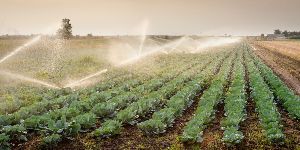Why Do Agricultural Properties Need Water Filtration?

Running an agricultural property requires irrigation equipment to provide water to crops and ensure robust growth. You may also need a steady supply of fresh water to keep livestock hydrated and healthy. Water treatment systems can remove any impurities before they reach your plants or animals. Here are some more reasons farmers need filtered water.
4 Benefits of Water Treatment Systems for Farms
1. Prevent Illnesses
If drinking water contains contaminants, livestock may develop potentially serious illnesses. Blue-green algal spores are common impurities that are highly toxic to animals, potentially causing labored breathing, tremors, and liver damage when ingested. Additionally, water that contains high levels of sulfates can deplete electrolytes from the bodies of animals and cause them to have diarrhea. Water filtration can remove these spores and minerals, promoting the health of your livestock.
2. Balance pH

Most plants require a balanced soil pH of 5.5 to 6.5 in order to grow healthy and strong. If soil falls out of this range and becomes too alkaline or acidic, it may damage the structure of dirt particles, preventing plant root systems from absorbing essential nutrients.
Additionally, an unbalanced pH can allow harmful bacteria to reproduce in the soil, infect roots, and diminish crop health. Using unfiltered water to irrigate plants may permit carbonates and dissolved solids to raise or lower the soil pH. You can prevent crops from drying out or dying by adding a water treatment system to your farm.
3. Remove Harmful Salts
Unfiltered water often contains a high volume of soluble salts. When applied to crops, these minerals may injure root systems, making it more difficult for water and nutrients to penetrate them. Salts might also gradually accumulate in leaves, causing them to dry out and die. A water treatment system that uses reverse osmosis technology can desalinate fluids and keep levels of soluble salts low enough to prevent harm to plants.
4. Increase Effectiveness of Pesticides
Pesticides sprayed onto crops can kill harmful insects such as aphids and beetles, preventing them from damaging plants. However, contaminants such as magnesium, iron, and aluminum in unfiltered irrigation water may bind to insecticide particles and remove them from foliage, leaving crops unprotected against these pests. Water filtration can extract these impurities, making fluids less likely to strip pesticides and enhancing their effectiveness.
Improve the quality of water for your agricultural property with filtration systems from Ernst Irrigation. They provide irrigation services and farm equipment to clients throughout St. Paul, OR. Call (503) 633-1111 to get started on a customized water treatment system, and visit the website to learn more about how they can help you manage and maintain your farm.
About the Business
Have a question? Ask the experts!
Send your question

